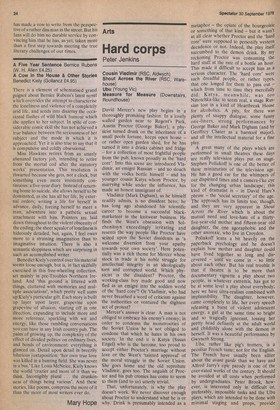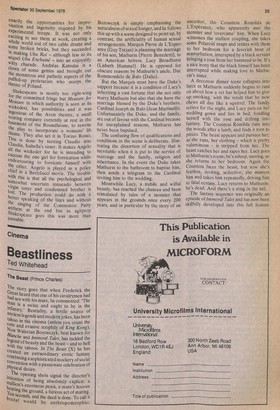Arts
Hard corps
Peter Jenkins
Cousin Vladimir (RSC, Aldwych) Shout Across the River (FISC, Warehouse) Ubu (Young Vic) Measure for Measure (Downstairs, Roundhouse) David Mercer's new play begins in a thoroughly promising fashion. In a lovely walled garden near to Regent's Park, Austin Proctor (George Baker), a physicist turned drunk on the inheritance of a small pools fortune, keeps open house — or rather open garden shed, for he has turned it into a drinks cabinet and fridge — for a collection of most frightful people from the pub, known proudly as the 'hard, core'. Into this scene are introduced Vladimir, an emigre Russian — and no slouch with the vodka bottle himself — and his younger cousin Katya whom Proctor, by marrying while under the influence, has made an honest immigrant of.
Vladimir (Mark Digham), as he himself readily admits, is no dissident hero; he has long ago abandoned his scientific career to become a successful blackmarketeer in the knitwear business. He finds the West's obsession with Solzhenitsyn exceedingly irritating and resents the way people like Proctor have seized upon the Soviet dissidents as 'a welcome diversion from your apathy towards your own society'. Here potentially was a rich theme for Mercer whose stock in trade is his noble struggle for intellectual integrity in an ideologically torn and corrupted world. Which physicist is the dissident? Proctor, the working-class boy made good and now fled as an emigre into the sodden world of the 'hard core'? Or Vladimir, who had never breathed a word of criticism against the authorities or ventured the slightest act of protest?
Mercer's answer is clear. A man is not obliged to embrace his enemy's enemy; in order to condemn the monstrosities of the Soviet Union he is not obliged to condone that which he hates in his own society. In the end it is Katya (Susan Engel) who is the heroine, too proud to accept either Proctor's marriage without love or the West's 'tainted approval' of the moral struggle in the Soviet Union. She goes home and the old reprobate Vladimir, goes too. The anguish of Proctor and his pub cronies has come to seem to them (and to us) utterly trivial.
That, unfortunately, is why the play doesn't work. We never discover enough about Proctor to understand what he is or why. Drink is presumably intended as a metaphor — the opiate of the bourgeoisie or something of that kind — but it wasn't at all clear whether Proctor and the 'hard core' were supposed to personify western decadence or not. Indeed, the play itself succumbed to the demon drink. By my reckoning Proctor was consuming the hard stuff at the rate of a bottle an hour. This made it difficult to accept him as a serious character. The 'hard core' were such dreadful people, or rather types, that one longed for them to pass out — which from time to time they mercifully did. Katya, meanwhile, was too Ninotchka-like to seem real, a stage Russian lost in a kind of Heartbreak House for alcoholics. A pity, for there was plenty of snappy dialogue, some funny one-liners, strong performances by George Baker and Mark Digham (and by Geoffrey Chater as a barstool major), and all the intellectual material for a fine play. A great many of the plays which are performed in small theatres these days are really television plays put on stage. Stephen Poliakoff is one of the better of these miniaturists of the television age. He has a good ear for the whimpers of our dispirited times and a camera-Uke eye for the changing urban landscape; this kind of dramatist is — in David Hare's phrase — the 'social secretary' of the age. The approach has its limits too, though, and they are very apparent in Shout Across the River which is about the mutual need and love-hate of a thirtyfive-year-old mother and fifteen-year old daughter, the one agoraphobic and the other anorexic, who live in Croydon.
Poliakoff leans a bit heavily on the paperback psychology and he doesn't explain how mother and daughter could have lived together so long and discovered — until we come in — so little about each other. But his real trouble is that if theatre is to be more than documentary vignette a play about two people, in whatever extremis, has got to be at some level a play about everybody; here we have ultra-realism combined with implausibility. The daughter, however, came completely to life, her every speech releasing a burst of violent adolescent energy a girl at the same time so bright and so tragically ignorant, tossing her pretty head defiantly at the adult world and childishly alone with the demon in herself. It was a beautiful performance by Gwyneth Strong.
Ubu, rather like pig's trotters, is a peculiar French taste; not for the English.
The French have usually been sillier about the avant garde than we have and Alfred Jarry's epic parody is one of the over-rated works of the century. It should be avoided at all costs when performed by undergraduates. Peter Brook, how ever, is interested only in difficult or, preferably, impossible tasks and the Ubu plays, which are intended to be done with minimal staging and props, provide exactly the opportunities for im pro.visation and ingenuity required by his experimental troupe. It was not only exciting to see them at work, creating a Whole world out of two cable drums and some broken bricks, but they succeeded in making Ubu Roi — although less so its sequel Ubu EnchainO — into an enjoyably Witty charade. Andreas Katsulas is a Clown of some genius and brought out the monstrous and pathetic aspects of the puffed-up proletarian who usurps the throne of Poland.
Shakespeare is mostly too right-wing for the committed fringe but Measure for Measure in which authority is seen at its wickedest, has possibilities and it was ingenious of the Avon theatre, a small touring company currently at rest in the basement of the Roundhouse, to rewrite the play to incorporate a womens' lib theme. They also set it in Torino Rosso. This is done by turning Claudio into Claudia, Isabella's sister. It makes Angelo all the wickeder for he is intending to execute the one girl for fornication while endeavouring to fornicate himself with the other. Angelo is played as a police chief in a Bertolucci movie. The trouble With this is that all the psychological and snmewhat uncertain innuendo between virgin sister and condemned brother is lost. The production could do with a better speaking of the lines and without the singing of the Communist Party anthem at the end but as agitprop Shakespeare goes this was more than passable.



































 Previous page
Previous page